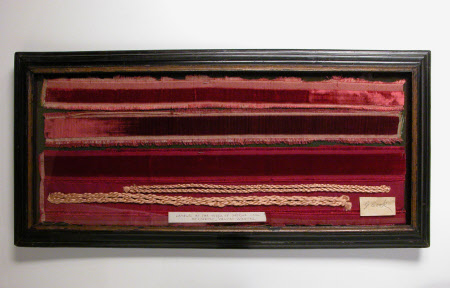Velvet sample
George Cook of Sudbury
Category
Textiles
Date
Unknown
Materials
Velvet, Wood, Glass, Paper
Measurements
250 mm (H)520 mm (W)
Place of origin
Sudbury
Order this imageCollection
Snowshill Manor and Garden, Gloucestershire
NT 1338395
Summary
Dark wood framed samples of red velvet and gold woven rope which is the work of George Cook of Sudbury, Velvet Weaver. Two small strips of red velvet at top and one larger, thicker strip below, all pinned to backboard with small steel pins. Two samples of gold braiding on bottom of thicker piece, also held with same pins. Dark wood frame with gold-painted insert. New backboard to frame. One metal loop each side to hang. Glazed. Paper label inside bottom right corner, signed ‘G. Cook’. White paper tape stuck to bottom centre of glass reads ‘SAMPLES OF THE WORK OF GEORGE COOK OF SUDBURY, VELVET WEAVER’ In notebook no.4, page 96 (1340945.4) Charles Wade refers to: 'Mizzen 11. Another Loom (dismantled on shelf) belonged to Geo. Cook, an expert weaver of the finest velvet. Frame on wall with samples of his work & a piece of the velvet he wove for Edward VII coronation, and photograph of him at his loom' In notebook 'Snowshill Manor in Holesford Hundred Gloucestershire' (1340960) page 97, Charles Wade states 'To Cottage of an old Weaver at SUDBURY, who made the finest silk and velvets. Named George Cook, then still working at his loom. There he made Velvet for the coronation of Edward VII'. In Haphazard Notes Volume Two (1340941.2 - SNO.MISC.952.2) Charles Wade refers to George Cook while discussing his treasure seeking. 'To cottage of an old weaver, who made the finest silks and velvets – GEORGE COOK at SUDBURY SUFFOLK then still working at his loom, here he made velvet for the Coronation of Edward VII. A craftsman of the highest skill. Skill totally unappreciated by his wife, who had hung to the mantel shelf of his room, the vilest piece of cheap (xxx?) plushet!' (Page 26)
Provenance
Given to the National Trust with Snowshill Manor in 1951 by Charles Paget Wade.
Makers and roles
George Cook of Sudbury
References
Wade, 1944: Charles Paget Wade, Contents of Snowshill Manor. Volume 4 First and Second Floor, 1944, page 96 Wade, 1953: Charles Paget Wade, Snowshill Manor in Holesford Hundred Gloucestershire, Notebook 1953, page 97
